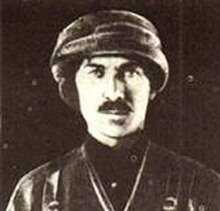Çerkes Ethem
| Çerkes Ethem | |
|---|---|
 |
|
| Born | 1886 Bandırma, Hüdavendigâr Vilayet, Ottoman Empire (present-day Balıkesir, Turkey) |
| Died | 21 September 1948 Amman, Jordan |
| Resting place | Cemetery of Habjouka in Al-Misdar, Amman, Jordan |
| Other names | Pshevu/Pşevu Çerkez/Çerkes Edhem/Ethem |
| Education | Bakırköy Cavalry Junior Officer School |
| Known for | Militia leader gained fame for fighting against the Allied powers invading Anatolia |
| Height | 2.00 m (6 ft 7 in) |
| Parent(s) |
|
Çerkes Ethem (Turkish for "Ethem the Circassian"; 1886 – 21 September 1948) was a Turkish militia leader of Circassian origin who initially gained fame for fighting against the Allied powers invading Anatolia in the aftermath of World War I and afterwards during the Turkish War of Independence.
His family, of the Circassian (Adyghe) people, was originally from Circassia who migrated to Turkey in the 1860s. He was born in Emre village of Bandırma as the son of Pshevu Ali Bey. One of his brothers was a Member of Parliament for Saruhan (present-day Manisa) in the Grand National Assembly of Turkey's first legislative term and previously in the fourth term of the Chamber of Deputies of the Ottoman Empire. His other brother was a senior military officer who graduated from the Turkish Military Academy in 1902.
Ethem the Circassian had blond hair, light blue eyes, and very pale skin, as described by Halide Edip Adıvar. He stood at 2.00 m (6 ft 7 in) tall.
He ran from home when he was 14 years old to join Bakırköy Cavalry Junior Officer School. He joined the Balkan War and was wounded on the Bulgarian front. As a result he was awarded with honours and seniority allowance. Later he joined Teşkilat-ı Mahsusa organized by Eşref Kuşçubaşı and participated in operations in Afghanistan and Iraq during World War I. He was again wounded and retired to his village. For a while he took up banditry in the mountains. He then founded Kuvâ-yi Seyyâre which was the only organized military force in Anatolia during 1919–1920, period between the Armistice of Mudros and the Treaty of Sèvres. He coordinated his military operations with Ali Fuat Paşa in Ankara and harassed the invading Greek armies with his fast cavalry. He was instrumental in putting down various rebellions against the authority of the Grand National Assembly of Turkey. Eventually he had a disagreement with the İsmet İnönü government in Ankara, refusing to join his forces with the regular army established under the command of İnönü Paşa. Newly-reconstituted Turkish Army had to put down the situation whilst also fighting the Greeks at First Battle of İnönü. His alleged subsequent surrender to and cooperation (disputed by historians in Turkey until his restoration of honour) with the Greek army resulted in his citizenship getting revoked on the grounds of treason and his being announced a persona non grata by the TBMM, amongst many others. From Greece, he went to Jordan and settled there.
...
Wikipedia
